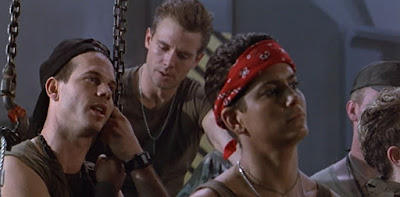**SPOILERS!**
This movie is about an Army Lieutenant named Driscoll. At the beginning of the movie, it's the end of the civil war, and he's shot off his horse by a Confederate soldier, who at least has the courtesy to take him to the surgeon's tent, and not let him bleed to death. He recovers and heads West with his regiment to fight Indians... only to be stymied in his violent ambitions by generals and peace treaties. The nerve! He's sent as escort (wet nurse, in his opinion) to a troop of Army engineers who will be building an Army fort in a place agreed upon by the Army and the Indians. Driscoll immediately recognizes this spot is all wrong and has no military value. But will anyone listen to him? No! However, a renegade Indian kills his commanding officer, and he finally gets to take over and do things his way. Peace treaty? P'fah. He scouts out a new, completely unsanctioned (but an actually useful) location for the fort, one with a great view, and one that can only be approached/attacked from one direction. Work gets underway, but his new fort location and direct violation of the agreement has angered the Indians. They attack en force. With barely half a wall built, it doesn't matter that there's only one direction from which the Indians can attack the new fort. They easily overrun Driscoll's camp, massacre the soldiers, and take Driscoll prisoner. Because he interfered earlier in a Sioux form of justice, the "run of the arrow," the penalty is death... by being skinned alive. Poor Driscoll. It isn't a pretty way to go. Fortunately for him, the confederate soldier who shot him in the beginning of the movie, has been living with the Sioux, and is on hand to shoot him again to put him out of his misery. Which nicely brings things full circle.
What? That's not the movie's plot? Of course it is! From the point of view of a Ralph Meeker fan, that is. Cuz Meeker's why I was watching the movie, naturally.
The plot everyone else is watching apparently concerns the Confederate soldier, O'Meara, played by Rod Steiger. He's so angry and bitter and full of hatred that the South surrendered, that he heads West, survives the run of the arrow himself and becomes a Sioux. He might be full of identity issues, about himself, about the new United States, about which side he's on. He might become the designated scout the Sioux lend to the army to help them get to the designated spot to build their fort. He might try to keep the peace and convince the soldiers to surrender. He might decide he's more American than Sioux, and return with the army. The movie might actually be his story.
It's always interesting how many "movies" there are within one movie, isn't it? LOL!
(the other guy the movie may be about)
Lt. Driscoll could almost turn into Roy Anderson, the dishonorably discharged, morally unstable lieutenant from The Naked Spur, if Driscoll hadn't been killed at the end of Run of the Arrow. Driscoll's far more callous and self-aggrandizing than Anderson, but they're close cousins. Which means Meeker is perfect for playing Driscoll and is clearly having fun chewing scenery. He's rather delightful, as he usually is. All cigar-chomping, chafing at being told "no" every other minute. His smug grin when he finally takes over command shows no compassion whatsoever for the poor captain who's just been killed and shines with pure Meeker smirkiness.
The captain is played by Brian Keith. He's lovely in the role, nice (too nice to survive this world), honorable, steadfast, honest, and rule-following. He puts Driscoll in his place a few times (as Driscoll's resentment grows). He also has some nice pointed conversations with that other guy, O'Meara. His death was very sad, everything he worked for lost in a heartbeat.
Charles Bronson plays Blue Buffalo. He doesn't get much to do other than show off his fine physique. It is mighty fine.
H.M. Wynant plays Crazy Wolf, the Indian equivalent of Driscoll. The one who passionately hates the other side, who won't obey orders, and causes no end of trouble for everyone. If someone had just let those two hot-heads fight each other to the death, it would have saved everyone else a lot of pain and suffering. Those two really mess all the hard-earned peace everyone else is trying to preserve.
This was a surprisingly short movie, less than 90 minutes, and it feels too short to me. I wanted more time with the characters. However, the short running time keeps it fairly tight and ALL extraneous stuff is cut out. That's not necessarily a bad thing. It shows the Native Americans in a fair light. There are good and bad people on both sides. Some strive for peace, some for war. Some live on hate, some live on love.
There's lots of action, including the titular Run of the Arrow. It consists of giving a barefoot person a head start, and letting them run for their life across the desert while the tribe chases them down. No one has ever survived it, until O'Meara does, with the help of Yellow Moccasin (Sarita Montiel). Surviving the run of the arrow is what cements his place in Sioux life.
































